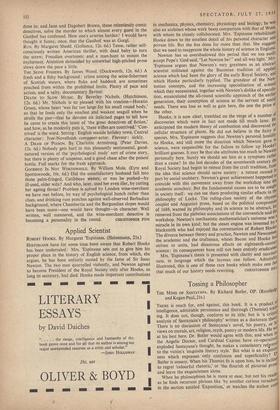Applied Scientist
ROBERT Hooxe. By Margaret 'Espinasse. (Heinemann, 21s.) HISTORIANS have for some time been aware that Robert Hooke has been underrated : Mrs. 'Espinasse sets out to give him his proper place in the history of English science, from which, she argues, he has been unfairly ousted by the fame of Sir Isaac Newton. The two men quarrelled violently, and Newton agreed to become President of the Royal Society only after Hooke, so long its secretary, had died. Hooke made important contributions
in mechanics, physics, chemistry, physiology and biology; he %; as also an architect whose work bears comparison with that of Wren, with whom he closely collaborated. Mrs. 'Espinasse rehabilitates Hooke down to the smallest detail of his personal character and private life. But she has done far more than that. She suggests that we need to reappraise the whole history of science in England.
Newton has so overshadowed this period that we too easilY accept Pope's 'God said, "Let Newton be!" and all was light.' Mrs. 'Espinasse argues that Newton's very greatness as an abstract scientist militated against the Baconian tradition of applied science which had been the glory of the early Royal Society, and which Hooke particularly typified. The grandeur of the NeW' tonian concepts, and the increasing specialisation of science which they necessitated, together with Newton's dislike of specula' lion, emasculated the alkound scientific approach of the earlier generation, their conception of science as the servant of social needs. There was loss as well as gain here, the one the price Of the other. Hooke, it is now clear, trembled on the verge of a number of discoveries which were in fact not made till much later. fle anticipated the modern theory of combustion and discovered the cellular structure of plants. He did not believe in the fixity 01 species. Mrs. 'Espinasse suggests that Newton's personal hostiliq to Hooke, and still more the direction which Newton gave t° science, were responsible for the failure to follow up Hooke's brilliant guesses. It may be that she attributes too much to Newton personally here. Surely we should see him as a symptom rather than a cause? In the last decades of the seventeenth century the Royal Society had begun to retreat from the craft tradition, frcal the idea that science should serve society : a retreat caused la part by social snobbery. Newton's great achievement happened 10 coincide with this movement away from the workshop into the academic armchair. But the fundamental causes are to be sotet in society itself: we can see them producing similar effects in the philosophy of Locke. The ruling-class society of the rhyMed couplet and Augustan prose, based on the political compromise of 1688, wanted its philosophy and its science to be abstract, itif removed from the plebeian associations of the conventicle and the workshop. Newton's mechanistic mathematician's universe was e miracle in its own kind; but the steam engine was invented bY blacksmith who had enjoyed the conversation of Robert Hooke. The divorce between theory and practice, Newton and NewcoMe the academic and the craftsman, whom Bacon and Hooke hail striven to unite, had disastrous effects on eighteenth-centtirY science: its consequences have still not been entirely eradicated Mrs. 'Espinasse's thesis is presented with clarity and succinct ness, in language which the layman can follow. Admiratl) illustrated, this is one of those rare books which make one fee that much of our history needs rewriting. CHRISTOPHER 81


































 Previous page
Previous page